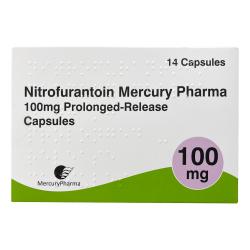- First line treatment for cystisis (UTI's)
- Long acting forumlation
- Twice daily dosage / Three day course
Nitrofurantoin 100mg MR Capsules
Nitrofurantoin MR Capsules is used to prevent and treat infections of the bladder, kidney and other parts of the urinary tract.
Nitrofurantoin is the first-line antibiotic treatment for urinary tract infections (UTIs), clearing up the infection rapidly and allowing you to resume your life free of symptoms.
About Nitrofurantoin 100mg MR Capsules
What is Nitrofurantoin?
This medication is an antibiotic used to treat bladder infections (acute cystitis) and works by stopping the growth of bacteria within the bladder.
Nitrofurantoin is also known by the brand names Macrobid and Macrodantin and should not be used to treat infections outside of the bladder (including kidney infections). This is because the drug is rapidly excreted by the body, and is concentrated in the bladder, making it ineffective at treating any other types of infections.
How to take Nitrofurantoin
Take this medication with food as directed by your doctor, usually twice daily (every 12 hours).
Do not use magnesium tricilicate-containing antacids while taking this medication. These antacids can bind with nitrofurantoin preventing its full absorption into your system.
For the best effect, take this antibiotic at evenly spaced times. To help you remember; take this medication at the same time(s) every day.
Continue to take this medication until the full-prescribed amount is finished, even if symptoms disappear after a few days. Stopping the medication too early may allow bacteria to continue to grow, which may result in a return of the infection.
Inform your doctor if your condition persists or worsens.
Side effects & precautions
Before taking nitrofurantoin, tell your doctor or pharmacist you are allergic to it; or if you have any other allergies. This product may contain inactive ingredients, which can cause allergic reactions or other problems. Talk to your pharmacist for more details.
This medication should not be used if you have certain medical conditions. Before using this medicine, consult your doctor or pharmacist if you have: kidney disease (this is because this drug is removed by the kidneys and requires good kidney function), a certain genetic condition (G-6-PD deficiency), and a history of liver problems due to nitrofurantoin use in the past.
Before using this medication, tell your doctor or pharmacist your medical history, especially if you have liver and lung disease, numbness/tingling of the arms/legs, vitamin B deficiency, blood disorders (e.g. anaemia) and diabetes.
Nitrofurantoin is safe to use during pregnancy, however, this medication should be used only when clearly needed. It must not be used towards the end of your pregnancy (38-42 weeks), or at the time of labour or delivery.
Discuss the risks and benefits with your doctor.
This medication passes into breast milk and may have undesirable effects on nursing infants younger than 1-month-old or those with a certain genetic condition (G-6-PD deficiency).
The most common side effect of nitrofurantoin is an upset stomach, however taking it either with, or straight after food will help prevent a stomach upset.
Other common side effects include headaches, nausea and diarrhoea. These side effects should not become too uncomfortable, or persist for too long, however if they do, please notify your doctor.
Remember that your doctor has prescribed this medication because he or she has judged that the benefit to you is greater than the risk of side effects.
Another common side effect of this medication is it may cause your urine to turn dark yellow or brown in colour, which can appear alarming at first, however this is usually harmless, a temporary effect, which will disappear when, the medication is stopped.
In some occasions however, dark brown urine can also be a sign of rare side effects (liver problems or anaemia).
Access Doctor would always recommend that you seek immediate medical attention if you notice dark urine along with any of the following symptoms:
- Nausea
- Vomiting
- Stomach/abdominal pains
- Yellowing of the eyes or skin
- Tiredness, fast/pounding heartbeat.
Other signs to look out for are:
- Eye pain/vision changes
- Mental/mood changes
- Persistent/severe headaches
- Easily bruising/bleeding
Seek medical advice and speak to a doctor straight away if you notice any of these symptoms.
AccessDoctor recommends using Nitrofurantoin (Macrobid) for a short course of between 3 to 7 days. This should be long enough to treat the majority of acute and uncomplicated bladder infections.
If you are experiencing repeated symptoms of urinary tract infections, or if a 7-day course of Macrobid has not treated your symptoms fully, we suggest you should seek medical advice from a doctor for further investigation before starting another course of antibiotic treatment.
The use of nitrofurantoin (Macrobid) for prolonged or repeated periods may result in oral thrush or a new vaginal yeast infection. Contact your doctor if you notice white patches in your mouth or a change in vaginal discharge or other new symptoms.
Documentation
Macrobid Patient Information Leaflet (PIL)



We’re here to help.
Our friendly team is available to help Monday to Friday 9:00am - 5:00pm.
If you need urgent assistance, do not use this service. Call 111, or in an emergency call 999.

